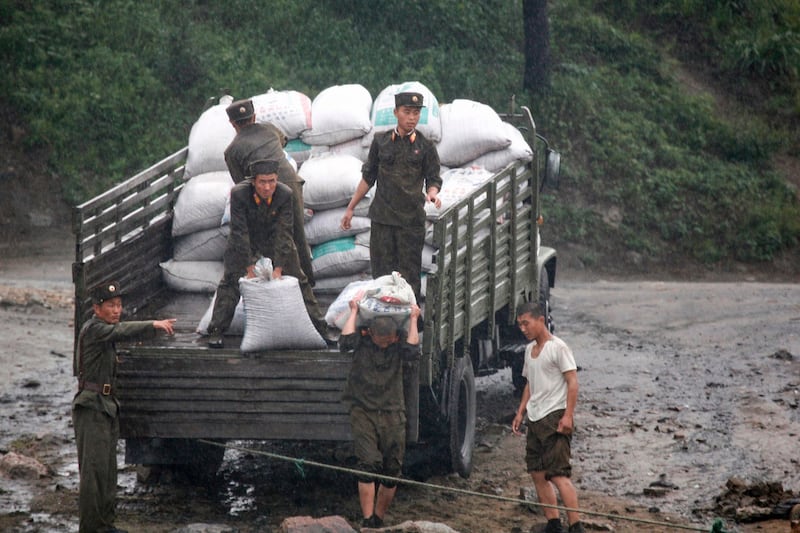North Korean leader Kim Jong Un has ordered the country’s Civil Defense Department and the military to prioritize the replenishment of military food reserves “at all costs by the end of November,” several local sources told Radio Free Asia.
Usually, the allotment for military provisions and other rations is determined at the end of December, once the autumn grain harvest has completely dried. But that deadline has been brought forward by a month, according to a source in Ryanggang Province.
Some experts said the move was simply to restore reserves depleted over the past couple years because of the pandemic lockdown and drop in trade with China.
“This seems like a routine order to restore those wartime stockage levels now that trade with China has restarted,” a former U.S. defense official who served in South Korea said.
But others said it could indicate that Kim is preparing for military provocations in the coming months against the United States and South Korea.
Each corps of the People’s Army keeps a year’s worth of food for soldiers in case of war and another one month’s worth of food in case supplies are cut off during wartime. There is also rice that is stored for industrial use and another three-month wartime allotment for civilians, the Ryanggang Province source said.
Wartime reserve food is largely divided between the national leaders’ share and the share that is stockpiled by the General Rear Services Bureau for soldiers in case of war, the source said.

Kim’s instructions were delivered at an official lecture on Oct. 21 to Workers’ Party officials, he said.
“The instructions were to completely maintain the equipment and materiel of the regular army and civil defense forces,” he said. “They will be maintained so they can be mobilized at any time, and to fill the wartime food reserve as the top priority.”
Warehouses almost empty
Many North Koreans were unable to farm properly during COVID-19. In response, authorities released rice to keep people from starving.
People had expected that government food rations would be normalized in 2024 due to a good harvest this year, according to a source from Chagang Province who requested anonymity for personal safety.
“But now, if all the wartime food reserves have to be refilled, the residents won’t have enough food to eat,” she said. “The country hasn’t saved any food reserves for wartime in recent years.”
“We often hear news that Warehouse No. 2 – which stores city and county wartime food reserves – is empty,” she said. “The food storage warehouses for the General Rear Services Bureau of the People’s Army are also almost empty.”
The United States Department of Agriculture predicted in an Aug. 28 report that North Korea’s rice production in 2023 would be about 2.1 million tons, similar to 2022.
Kim is using North Korea’s military reserve system to try to reestablish central control over key materials before winter, according to Sydney Seiler, the national intelligence officer for North Korea at the U.S. National Intelligence Council.
He added that it’s also possible that Kim is planning provocations to embarrass the government of South Korea’s President Yoon Suk Yeol.
Translated by Claire Shinyoung Oh Lee and Leejin J. Chung. Edited by Matt Reed and Malcolm Foster.
